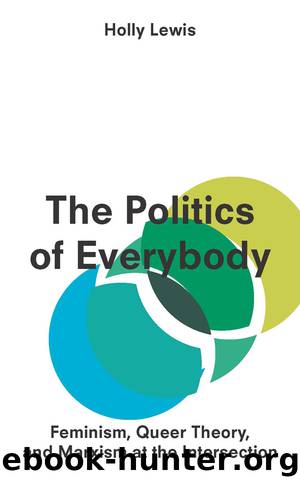The Politics of Everybody by Holly Lewis

Author:Holly Lewis
Language: eng
Format: epub
Publisher: Zed Books
Published: 2015-09-16T16:00:00+00:00
CHAPTER 3
From queer nationalism to queer Marxism
I. The vector model of oppression
Towards the early middle of the twentieth century, new European political theories emerged after the failures of Enlightenment rationalism and German Romanticism. The West was tasked with grasping the unthinkable (the Holocaust) and the unthinking (the mass adoption of fascism). Theorists wanted to go beyond the surface logic of political operations in order to investigate the mass psychological and emotional traits that concretized political ideology. While in the United States politics became yoked to positivist analyses of data sets, in Europe issues of consciousness, ideology, and the power of language and imagery drove academic inquiry: could structural a priori formations in the unconscious account for human behavior and desires? Is the subtext of rational communication its actual message? How is technology transforming not just the delivery but the ideological content of material? At best, Marxian historical materialism was thought to be epistemologically weak, incapable of grasping the total picture. The notion of history seemed to operate as a logical imposition on quasi-logical and radically contingent causal chains; analyses of language and meaning began to replace inquiries into actual economic processes. This phenomenon in continental thinking came to be known as ‘the linguistic turn’ in Western thought (see ‘Philosophy and the Marxian roots of queer political thought’ in Chapter 1). Unimpressed with continental philosophy’s goal of grasping the ineffable, philosophers in the US turned towards analytic philosophy, which endeavored to tame existential chaos through absolute precision in language.
In other words, while they differed over methods and areas of inquiry, both varieties of philosophical thinking maintained that the best way to assess the anarchy of life under capitalism was to get a better grasp on language and meaning. Despite Louis Althusser’s attempt to build a philosophical anti-humanism opposed to Enlightenment Man (‘the spoiled brat of history’) as the origin and agent of all meaning, the mid-century focus on language generated an obsession with human thought patterns. With the advent of Jacques Derrida’s deconstructive method, language became the Platonic overlord of puny human attempts at thought. Text preceded speech. Language itself made meaning, while humans were left mouthing words that never quite described their intentions. People were not masters of language; language was the master of people. The possibility of freedom and agency would be located in moments of radical indeterminacy. The philosopher Martin Heidegger described this as beings being thrown into a world of language, into language systems that precede the existence of individual beings (see Heidegger 1971). As a result, continental academic writing began to sound a bit like religious incantations, impenetrable to the uninitiated. Where Anglophone philosophy saw European pretensions in continental language – a bunch of meaningless babble masquerading as profundity – the continental European tradition saw analytic attempts at clarity as at best pedantic, and at worst another kind of pretension, one grounded in an American need to dominate reality as a whole, to capture the ineffable within a system of command and control.
From a Marxist perspective,
Download
This site does not store any files on its server. We only index and link to content provided by other sites. Please contact the content providers to delete copyright contents if any and email us, we'll remove relevant links or contents immediately.
| African-American Studies | Asian American Studies |
| Disabled | Ethnic Studies |
| Hispanic American Studies | LGBT |
| Minority Studies | Native American Studies |
Cecilia; Or, Memoirs of an Heiress — Volume 1 by Fanny Burney(32546)
Cecilia; Or, Memoirs of an Heiress — Volume 2 by Fanny Burney(31945)
Cecilia; Or, Memoirs of an Heiress — Volume 3 by Fanny Burney(31929)
The Great Music City by Andrea Baker(31916)
We're Going to Need More Wine by Gabrielle Union(19034)
All the Missing Girls by Megan Miranda(15957)
Pimp by Iceberg Slim(14488)
Bombshells: Glamour Girls of a Lifetime by Sullivan Steve(14057)
For the Love of Europe by Rick Steves(13908)
Norse Mythology by Gaiman Neil(13348)
Talking to Strangers by Malcolm Gladwell(13347)
Fifty Shades Freed by E L James(13232)
Mindhunter: Inside the FBI's Elite Serial Crime Unit by John E. Douglas & Mark Olshaker(9322)
Crazy Rich Asians by Kevin Kwan(9277)
The Lost Art of Listening by Michael P. Nichols(7494)
Enlightenment Now: The Case for Reason, Science, Humanism, and Progress by Steven Pinker(7306)
The Four Agreements by Don Miguel Ruiz(6744)
Bad Blood by John Carreyrou(6611)
Weapons of Math Destruction by Cathy O'Neil(6265)
